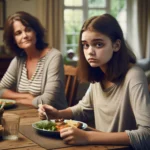Do you feel ready to share your eating disorder story with others?
Do you feel ready to share your eating disorder story with others?

Sometimes, sharing a secret with others we have never met, online, can seem easier to do than in a room with someone we have known all of our life. Stories can be shared in many ways: face-to-face, by letter or email, in mainstream media or on the Internet. Some online options allow anonymity while sharing thoughts and feelings publicly — but the rise of social media has taken participation to a new level.
The implications of sharing our story are discussed in my book Using Writing as a Therapy for Eating Disorders – The Diary Healer, with clinical psychologists, Kristine Vazzano and Ashley Solomon.
Just by ‘getting them out’, the thoughts and feelings that stem from an eating disorder may seem to lose their power, their scariness and control. There are important considerations, however, when sharing our story publicly. For instance, in deciding how and why we want to share your story, and what parts we want to keep private. The optimum time, and our target audience are other factors. Without care, offloading of thoughts and feelings may negatively affect a person who reads our story, or perpetuate triggers within our self.
Reasonably, we will consider how we might feel five years from now if we share all our angry, upset and deeply private thoughts right now – we will be able to consider the impact on those we love, and most likely will decide that some things are best kept private, at least in the short term. However, when we have an eating disorder, the voice of which is an incessant bully in our brain, we are not always able to think rationally or to consider the ramifications of our actions. And the Internet is very, very accessible. Depending on when and how we share our story, and with whom, what we say may be helpful or harmful. Living with an eating disorder is a very isolating experience, so is any connection with others better than no connection at all?
Perhaps most significantly, the digital landscape allows people with eating disorders the opportunity to connect with others who can understand their experience. Often they have been ill for a long period and experience low social support. The duration and complexity of their illness, paired with a lack of resources and understanding by others, can leave them feeling lonely, isolated and misunderstood.
– Kristine Vazzano
Online communication, as with the pen and paper diary, can be helpful for expressing our emotions but the Internet is like a big invisible forest and finding the right pathway to support our healing, rather than strengthen our eating disorder, or that of others, can be a challenge.
Venturing from private to public online
In the beginning and prior to recovery, there is much online that is tempting and distracting and many groups are negative. Some people find these negative groups “helpful,” but initially I got wrapped up in all the drama. I felt like there was competition, I was being triggered, in ways that were all the more emotional because of the drama that comes with not being fully fueled.
When better fueled and further along in recovery, I started connecting with online groups/social media again, and was better able to stay away from the negative drama and posts/pictures, and to use the positive resources out there, including receiving more and better support, and giving more and better support.
– Kristin*
As Kristin’s experience illustrates, a relationship with the Internet can be complex, depending on our illness phase. Pro-eating disorder web sites, which promote eating disorders as a lifestyle choice rather than a psychiatric illness, have been around since the Internet began to expand in the 1990s.
Also known as pro-ana and pro-mia web sites, these forms of communication appeal to people who are not actively ready for recovery. As social network sites have multiplied and grown, easy photo sharing and re-blog features have created an interactive milieu that allows information to be quickly and widely disseminated, promoting images glorifying the thin ideal, allowing followers to share tips and tricks that maintain their eating disorder, and providing support for maintaining their illness in a community-oriented and recovery-resistant way. Eating disorder sufferers can reach thousands of people with similar experiences by a single click or search, making their struggles feel more normal and syntonic.
Exposing a lack in the “real” world
I first came across pro-ana sites at the point where I chose recovery over my anorexia. I would spend most evenings late into the early hours of the morning googling “thinspiration.” I was mostly interested in the photos of really emaciated women… Often, usually after drinking too much, I would become very upset and feel I had no way out of what seemed like hell.
In one respect I was wanting to get better but in another way I wanted to be better at anorexia. I found it easier to write my emotions down as words. I would often “feel” things and when I was in this moment I would write it down.
I was involved in a lot of pro-ana websites and came across recovery blogs by accident…or fate! The recovery sites offered me hope, there were women just like me, who thought anorexia was a life sentence but had in fact recovered. The first recovery site I found originally began as a pro-ana site.
– Jackie*
Our truth goes far beneath the bone
Sharing our story with others can help meet a yearning for connection and belonging. However, as Jackie and Kristin describe, when we have an eating disorder, we can be duped. The challenge is for us to provide more options, which are welcoming, non-judgmental and accepting, for people with eating disorders and support them until they are able to gain sufficient self-awareness to want and be able to start working on recovery. Our story will differ, depending on when we tell it – that is, with the voice of our illness, or with our own true voice.
A guideline to sharing
My suggestions for sharing our story go like this:
- First, write for your self. You and you only. Let it all out. You are writing to yourself. Writing is healing!
- Second, discuss your story with someone you trust – your doctor, therapist, best friend, family member, minister of religion. Someone. Maybe show them extracts to help explain and emphasise what you are saying.
- Third, if you wish to widen your circle and share your story with close others, such as family and friends, or treatment team, rewrite your story with them as the audience in mind. This process, when undertaken with the person you trust, will help you reflect and become an observer of your experience thus far.
- Fourth, if you wish to share with “everybody” publicly, do another re-write, with this audience in mind. Again, this self-reflective and consultative process with people you trust, will assist your healing journey.
Seeing our real script – looking from the outside in
Reflection with Shannon Calvert**
When we have an eating disorder we may believe that, just like a movie, our story will end when we choose to rediscover life and come through to the other side. Even more reason to stay in the depths and hold onto the eating disorder a little longer, just until it feels safe enough to leave. Then, when it becomes unbearable enough and our story has earned the “Oscar,” then maybe it will be time to get the hell out! If only it worked this way.
I was convinced I would be able to leave the illness when I was “ready.” I did get to walk away, but it took 28 years and the experience throughout that difficult time was nothing like a movie. Only at the end could I see and write the real script.
We are not supporting each other if we feel it necessary to display on social media how many calories we are eating, how skinny we look or why we have been rushed to the emergency room. We are not supporting each other if we feel a need to publicly share our struggle by taking selfies dressed in a new outfit exposing nothing but bone and death.
This is the eating disorder playing dangerous games with us.
I have chosen not to befriend the enemy. An eating disorder is a cruel “friend.” It is not who I am and I have chosen after many lessons, mistakes, falls and fears to face saying “goodbye.” I have chosen to experience the grief and loss, and through this process, I learn to find and connect with my true self.
Encouraging each other to fight for recovery involves exposing the eating disorder for what it is, and denying rather than feeding its desires. The truth goes far beneath the surface, far beneath the bone.
We can share little of the truth until we are able to see within.
** Shannon Calvert is a consumer leader in recovery after 28 years with a severe and enduring eating disorder. As well as her eating disorder, Shannon lives a life in recovery after being diagnosed with depression, anxiety and PTSD. She is motivated and inspired to advance her experience and knowledge towards supporting others. Shannon’s interests are directed in mental health advocacy to support the respect, rights and appropriate choice of treatment for those affected. Her aim is to promote hope in recovery and to support individuals receiving eating disorder treatment including their families and services involved. Twitter: https://twitter.com/moonpharie
For more on sharing your story, see The Diary Healer
* Quotations are from participants in The Diary Healer.
Next week’s Dear Diary post will feature a review by Carolyn Costin of the movie To The Bone





